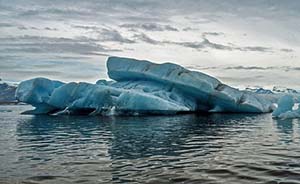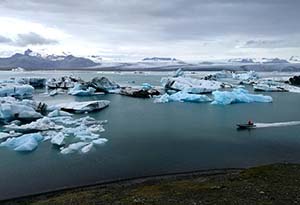Global Warming: causes and effects
 While scientific studies on the subject continue to pour in, great uncertainties still linger on over the quantitative assessment of climate change and over the role of Man in the current global warming.
While scientific studies on the subject continue to pour in, great uncertainties still linger on over the quantitative assessment of climate change and over the role of Man in the current global warming.
The hypothesis of such a link is nonetheless gaining more and more credibility in public opinion and reinsurers are getting immensely interested in the matter.
Read also | The 10 most costly climatic disasters
The causes of global warming
For the majority of climatologists, it is henceforth unquestionable that Man is playing a crucial role in climate warming. The rise of CO2 levels dejected in the atmosphere due to human activities is directly threatening polar icecaps, coral reefs survival, and even the sheer existence of low-land countries.
Resulting from the combustion of fossil fuels, carbon dioxide (CO2) is a persistent gas that has a lifespan in the atmosphere of nearly a century.
World CO2 emissions amounted to 5.8 billion tons in 1999. In 2020, they reached 40 billion tons. China is the first country generating carbon dioxide with 14.4 billion tons. The USA follows with almost 4.57 billion tons in 2020.
Forecasts show that CO2 emissions will increase annually by 0.6% between 2018 and 2020. The Energy Information Administration (EIA) projects a 46.9% increase in global energy demand between 2018 and 2050. At the end of this time period, fossil fuels will account for 69% of primary energy consumption.
Recourse to oil and fossil energy accounts for 80% of carbonic gas - the main responsible for the increase of green-house effect.
Methane (Ch4) is the second cause of global warming. This molecule is 28 times more powerful than CO2. CH4 is naturally present in the atmosphere, but certain human activities increase its concentration in the air.
Agriculture, particularly cattle breeding, alone produces 25 to 33% of methane emissions. In addition, the extraction of fossil fuels, in particular oil and gas, releases a considerable amount of this greenhouse gas.
Annually, nearly 342 million tons of CH4 are of human origin, i.e. 60% of global methane emissions.
The effects of global warming
- A rise in sea level
 According to the Intergovernmental Group of Experts on Climate Evolution (GIEC), an organism that gathers about 4 000 scientists all over the world, the average earth surface temperature has risen by 0.6° in the course of the last hundred years.
According to the Intergovernmental Group of Experts on Climate Evolution (GIEC), an organism that gathers about 4 000 scientists all over the world, the average earth surface temperature has risen by 0.6° in the course of the last hundred years.
A simulation by Max Planck Institute for Meteorology in Hamburg predicts that this rise in global temperature will be contained between 4.1° and 5.8°, while the rise of sea water levels will reach 30 cm by 2100.
- A reduction in plant production
A study conducted by the French Laboratory of Climate and Environmental Sciences (CEA-CNRPS), published by Nature magazine in September 2005, points out that plants production at the European level has dwindled down by 30% in 2003, in comparison with 2002, which unexpectedly resulted in a considerable reduction in the carbon quantity that is stocked by biomass.
Because of the tremendous heat and water stress, plants make use of their defense mechanisms that slow down photosynthesis and consequently the quantity of absorbed CO2.
If rising temperatures result in an increase in the frequency and intensity of droughts, vegetation will become less efficient at mitigating greenhouse effects.
On a planetary scale, cover crops makes it possible to capture between 10 to 20% of CO2 human emissions. However, these green shields risk turning into a threat with the possible transformation of ecosystems into a source of carbon.
- More violent hurricanes
In articles dating back to the months of August and September 2005, imminent climatologists have established «a smoking gun», that is a clear evidence linking global warming to the upsurge in hurricanes. According to them, even if the number of cyclones is not rising, extreme events tend to get more and more violent.
This conclusion relaunches the debate and in a more acute manner over the impact of climatic change on the emergence and intensity of tropical cyclones.
For, so far, the international scientific community has not managed to reach a consensus on the issue. Some hold global heating responsible for cyclonic activities, particularly strong as of 1995. Others refer to more complex and still misunderstood atmospheric mechanisms.
Research also takes into account the causes related to high-risk areas which are more densely populated and suffer more material damages, and the media coverage that amplifies the impact.
Global Warming: Insurers, stakeholders in the debate
Because they support an increasingly heavy burden of the disasters losses costs, insurers are a major stakeholder in the issue of natural hazards triggered by climatic disturbances.
The matter has been the highlight of the G8 agenda in July 2005 in Gleneagles, Scotland, during an international conference hosted by the Association of British Insurers (ABI). The latter presented a report which, for the first time, quantifies rising costs related to extreme bad weather in relation to cases of climate warming.
In the light of a study conducted by the Intergovernmental Pool on Climate Changing (IPCC) which shows that rising temperatures tend to make climates more volatile and natural disasters more violent, Insurers concluded that a slight increase in intensity is enough for damage costs to skyrocket.
As a consequence, the average bill related to extreme bad weather will rise from 16.5 billion USD in 2004 to 27 billion USD in 2080, that is, a 64% increase.
To face the problem, companies are required to increase their financial capacities. Capital requirements will report a 90% increase for hurricanes, 80% for typhoons and 5 to 10% for storms.